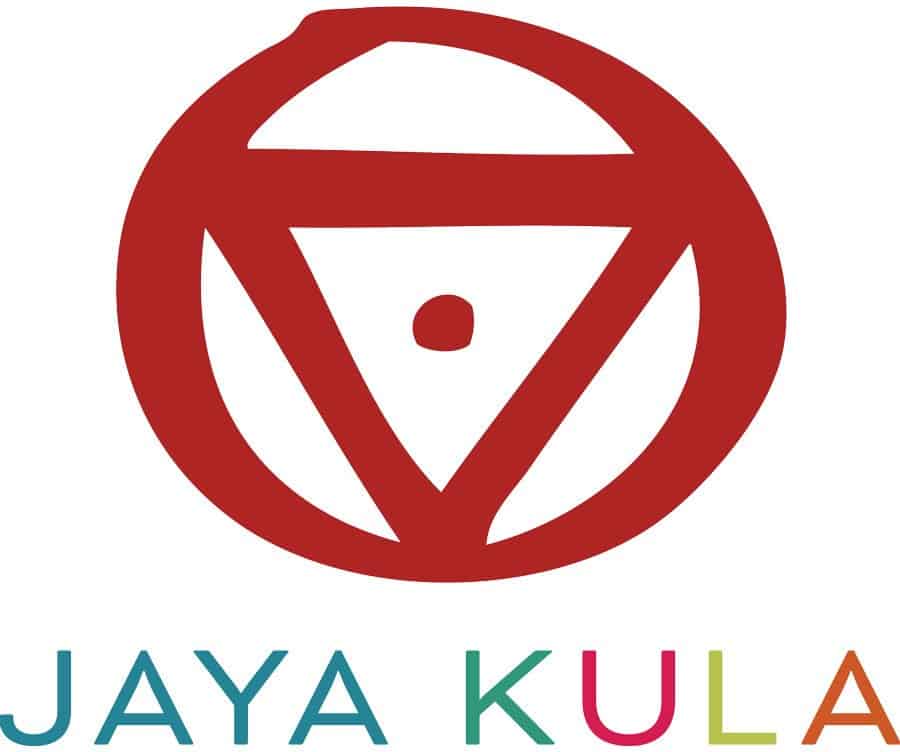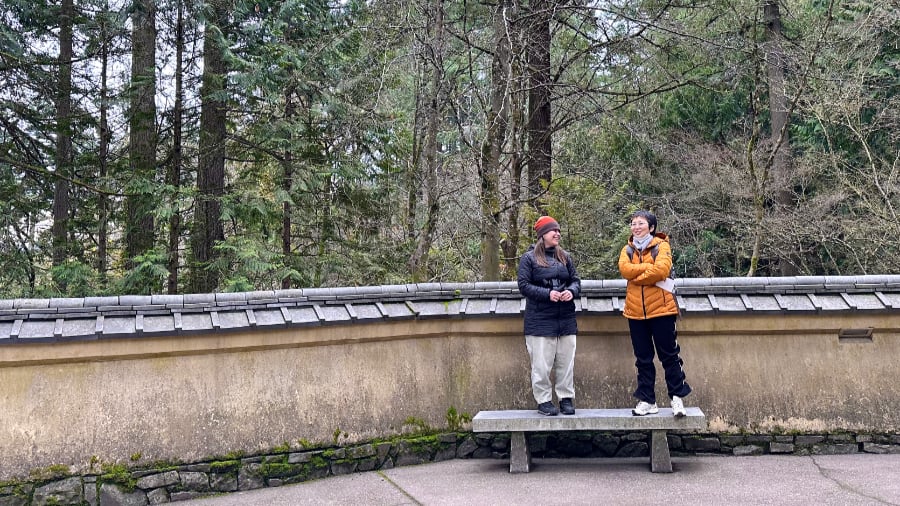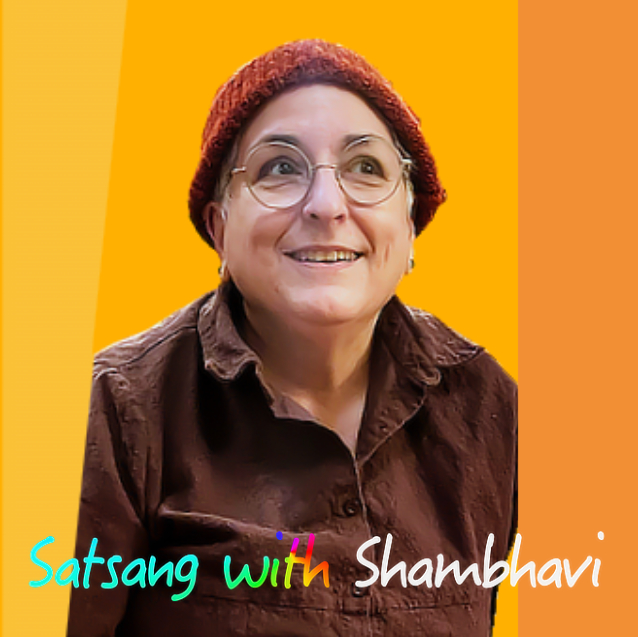Are you an obedient actor, self policing according to limiting internalized rules? Shambhavi talks about how we can be bolder and more creative. A podcast from Satsang with Shambhavi
SHAMBHAVI
Normally, we start satsang with somebody telling me what to talk about. But I wanted to talk about something today that I've talked about before. Because it's basically what I've been talking about my whole life in different ways.
It's pretty much the whole reason why I'm interested in doing spiritual practice and sharing it with other people. There's kind of two different ways into this, and they're different, but I'm going to throw both of these things out.
One is a movie that a lot of you know that I like. It's an old Imamura movie called Eijanaika. And it's about a sex worker living in the 1800s in a very repressive local governmental situation in Japan, where everything is highly regulated and militarized, and et cetera.
And she leads a street revolution to empower the people. And Eijanaika is her theme song. And it means why not? Why not take a chance? Why not have a revolution? Why not express yourself? Why not in all these different ways?
The other thing I'll throw out there, just as an inroad, is that in one of the meanings of the divination tradition that I study, the Yi Jing, one of the meanings of divination is open door. The basic approach of the Taoist text that we use for divination, which is an older version of the Yi Jing called the Zhouyi.
The basic approach to every single question that you might ask for divination is, where can I find the open door? The text recognizes, the tradition recognizes that in some situations we are extremely limited in our choices.
So for instance, there's a whole section of answers in the text called pit, or you're trapped in different ways. But the point of view of the text is, no matter how trapped we are, no matter how limited our choices are, there's always an open door.
There's always some way to move in a situation, even if it's very limited. And our job is to find out what that is so that we can keep progressing in our spiritual life. Even if we're not on a spiritual path.
Mine whatever opportunity there is in all circumstances, even if those opportunities are limited. Ever since I was sentient, really, ever since I remember thinking anything, having this experience that many people are cutting themselves off from opportunity.
We have a lot of concepts that we live by, and a lot of those concepts tell us what we can't do and what we shouldn't do and what's not possible. And we basically become what I call, good actors or obedient actors.
We self-police ourselves. Our concepts police us and tell us often what we can't do. Of course, there are other people out there like myself who are all about, how can I find the way to move?
But there are also many, many people who spend their whole lives self-policing themselves. And telling themselves what they can't do and what's not possible and what's not done, etc.
I myself have had this experience. I've told some of you this story before that I grew up in a lower middle-class household. We didn't fly. No one in my family ever went on a trip on an airplane.
Air travel was very much more expensive back then. Now you can get on a flight for 50 bucks and go somewhere. But back then, that wasn't true. Flying was much more of a big deal.
In any case, nobody in my family flew until I was already in my late teens or early 20s or something like that. I had inherited this idea that if you were going to fly somewhere, you had to prepare and you had to treat it as this special thing that you were doing.
I was already in my 40s when I had gone to some spiritual teaching that required flying somewhere. Then it was announced that one of my teachers was doing this very special teaching somewhere that would have required me to fly into Chicago and basically hang around the airport for an hour and then fly right out again to this other teaching.
And in my mind, I was saying to myself, no, I just can't do that. I didn't have any reason why I couldn't do that. I mean, I had the money to do it. It was just more, no, I just don't do that sort of thing. It isn't done. I can't do it. [laughter]
And it's just too much. It's too much trouble. I'm not going to take two flights in one day to different places. No, I just don't do that. So really, I didn't even think it out very carefully.
But when I got home and missed the teaching, consequently, the other teaching that I wanted to go to, it suddenly dawned on me that this whole apparatus of what I couldn't do was completely contrived. And completely a product of how I had grown up and my expectations of whatever my family had taught me to do or to not do.
This is how most of us live. We have a very narrow idea of what we can do and what we can't do, what's done and what's not done. This is something that really limits our opportunities, limits our self expression, limits our happiness, limits us in our spiritual life.
This is arising because somebody in our community has been expressing to me ever since the retreat, how much they're missing everybody, how much they're pining to be in community. Really expressing this to me with quite a bit of desperation and heart sickness.
This person who shall remain unnamed unless they feel like outing themselves. This is really just as an example, but I think we all do this. We all become these obedient actors conforming to rules that we've internalized that really have no basis in external reality.
And things may be difficult, but that doesn't mean they're not doable. There is no force stronger than desire. There is no force stronger than desire. And if you have very, very strong desire, you will find the means to move in situations in ways that are more in line with who you are and what you want.
The person that I'm talking about has means and opportunity and various kinds of privilege. And it would be very difficult for this person to move here, but it would be doable.
It would take some boldness. It would take some out-of-the-box thinking. It would take some strategizing. It would take a lot of things, but these are skills that we have.
If you want something that much and you've been given the opportunity to actually do something that is difficult and expensive, that's privilege. But we should put our privilege in service of what we believe in. That's what we should do with privilege.
The thing is, then we have certain other emotional patterns that keep us stuck in conditions of continual sadness. Or continually feeling angry and blocked, or whatever these patterns are.
And these emotional habit patterns that we call the six realms, for those who have studied with me, are also very powerful. They are basically desire under tension.
For instance, Hungry Ghost, which has a pattern of sadness and mourning. And constantly reinforcing the idea that you're missing something, and you won't get what you need and you're always missing out. That's the basic flavor of Hungry Ghost.
It perpetuates itself by not taking advantage of opportunities. By deliberately coming up with ways to sidestep doors that are actually fairly wide open compared to what many people experience.
What I want to say is that I'm doing this because I want people to be more expressive. And I want people to take more risks, and be more bold and creative in their lives. I want people to be having a life that they want to have.
Not a life that's constrained by a bunch of stuff that was bequeathed to you and that's just inhibiting you. I also want, and this is a tall order for some people, I want people to be able to step into zones that are less comfortable. So that we can have more opportunity.
There are certain discomforts that we're very used to. For instance, if we have a pattern of being angry or we have a pattern of being sad or whatever our pattern is, we're comfortable with those patterns. We might complain about it, but we're comfortable with them. They're like old blankets.
But if we're going to step into a new thing that's uncomfortable in a different way, fresher, more uncertain. Less grounded and familiar. This is what is required to have the most fruitful spiritual life.
It's required that we step into a fresh, more open zone. Where we don't know exactly what's going to happen. Where it's not familiar in the normal way, anyway.
I want to say Eijanaika, why not? Especially if you've been given the means, the privilege to organize your life around something like spiritual practice. Or whatever it is that you want, something that's going to be a benefit to others.
Especially if you've been given that privilege. Why not? What are you doing wasting your privilege sitting around moaning about everything? Many people have very many fewer choices. Their open doors are not as open as some other people's.
We all have open doors. We all have possibility. We all have room to express ourselves more and have more freedom in our lives. Why not? Be bolder. Be more creative. Don't be an obedient actor. Let yourself be afraid. Let yourself step into something fresh and new.
Don't avoid unfamiliar situations just because you're scared. Don't run into unfamiliar situations just because you think it's good to be scared, either. [laughter] I mean, we're wanting [laughter].
Some people, especially in certain swaths of this culture, think that being unhappy is a sign of you being more spiritual or something. It's not. We're not trying to have things be difficult just for difficulty's sake. Just to be heroic in some way or another. [laughs]
But we do have to step into something less familiar. We have to learn how to use all the tools that are ready to hand for us in order to creatively walk this path. Or whatever path it is that you're walking, and get the most result.
Mine the opportunities out of this life. That's what we're trying to do. Eijanaika, why not?
STUDENT 1
In the tradition that I practice, there's this phrase, yoniso manasikara which translates loosely to wise attention. The topic that you're ranting on now, there's a lot of wise attention in seeing the door sometimes.
Both the comfortable one and the uncomfortable one. And so why not, of course, but the art of being adept to skillfully see the door is not always as clear.
SHAMBHAVI
That's a very rich question. But I want to say first, before I get into the nuances of that. It's okay to make mistakes. Basically, we're all like bulls in a China shop, until we're not.
An old friend of mine used to say, we're neurotic until the nanosecond before we're enlightened. So we shouldn't be afraid in this process of improvisation and trial and error and call and response to make mistakes.
And we should experience what regret we experience and pick ourselves back up and continue to move in a positive, practical way. In thinking about wise attention and discernment and proper following, we don't want to get paralyzed or too constrained by a fear of doing it badly.
There's another expression, I don't know who said this, but definitely when I was younger and I still felt badly about doing things badly, it really helped me to get over that largely. And that aphorism is, anything worth doing is worth doing badly. [laughter] I think that's a really great thing to remember.
And then one of my most beloved teachers said, mistaking, mistaking, I follow the unmistaken path. Really making mistakes is how things happen. Anandamayi Ma said, coming and going, the thing will be done. Meaning we come closer to the thing and then we get distanced and disconnected. And then we come again.
The path is a careful, clear, discerning step-by-step, never making a mistake thing. It's sloppy because we are human and we don't have 100 % clear seeing, and in fact, we never will have 100 % clear seeing. We can asymptotically get closer to it, but that's the best we can hope for, in my opinion.
That being said, following is the way, following is the path. And as you said, following has to be preceded by listening. Or observing or having the gates of our senses open. So that we can perceive what it is that we're following.
So that we can hear the call. I refer to this as call-and-response. There's a call-and-response improvisation that's going on here in spiritual life and life in general. But listening is absolutely key.
Listening in the fullest possible way you can imagine, and subtly and for the nuance. I'm using listening as a stand in for all perception. Our senses are subtle enough that we can perceive wisdom's call.
Then we can follow it to the best of our ability. And that's what we should be doing to develop that skill. And of course, we develop that in spiritual practice. That's where our gates of our perceptions start to open more. And we can be better listeners and better followers.
We wanted to discern what is the door we should walk through, or where is the opportunity? My Dzogchen teacher, Namkhai Norbu, used to just say, we work with circumstance, we do our best. That was his bar. Do your best.
That means pushing yourself a little bit closer to or slightly over the edge of what you think you're capable of. But it doesn't mean doing it perfectly. Doing your best is the much more human benchmark.
But we do have to develop more discernment as we go along with better listening skills and better feeling skills. To feel where the energy is flowing and where the opportunity is. Absolutely.
But then we have to go there. There's courage involved also. There's a lot of courage involved in spiritual life. And having the confidence to just know that sincerity always wins the day.
Even if you just royally mess up, if we've done so with sincerity and devotion, it all is fine. Sincerity is much more important than perfection. Also, we always get more chances. The door is actually never closed, ever.
No matter how badly we do something, the door, it's always open again and again and again and again.
STUDENT 2
I've been reading over my notes on Hell Realm a little bit. And one of the things that was said was talk less so that it reduces the level of projection. And I was just like, I'm a pretty quiet person, so I think there's something else about it.
SHAMBHAVI
Well, I think talking could be internal dialog, too, not just externalized. What happens with Hell Realm is a lot of case-building. And so you get into this deep, deep fantasy where you are creating narrative about other people's motivations, and then you're building cases against them.
There's a deep feeling of shame and dislike of oneself. Basically building cases against other people and making it their fault. Sort of let some of that pain dissipate.
And we can get very deep into those narratives, deep into those fantasies. Until they seem absolutely like, okay, that's what really happened. The thing about, as you already know, about Hell Realm is that it's related to fire element.
So there's an element of clear-seeing in our construction of these cases against other people and blame. And our perception of having been done wrong in some way. It can become really, really crystallized until it's almost impossible not to believe ourselves.
So any way you can interrupt that, even those internal speeches would be good. Find some quiet insight. Finding what's underneath the talking mind and just trying to let yourself rest there. That might be a great thing to invoke when that's happening.
But those fantasies become very alluring. And they're so detailed that you convince yourself. And then it's harder to interrupt. But try to interrupt not with an antidote of any logic or thinking.
More thinking is not the antidote. Getting underneath all that is the antidote. Or just going out in nature is a good thing, too. Trees, flowers, smelling, really getting in an environment where you can smell nature is a really good thing to do. That does a reset, I think.
Sign up to receive email updates
Enter your name and email address below and I'll send you periodic updates about the podcast.


